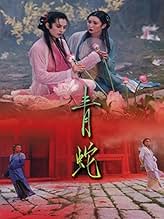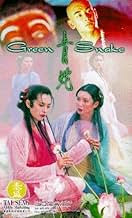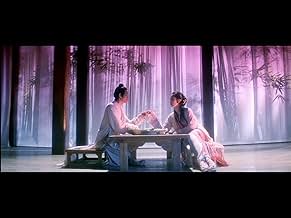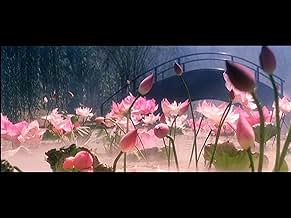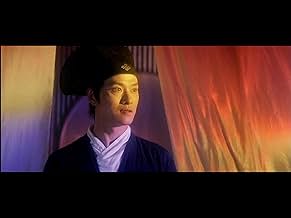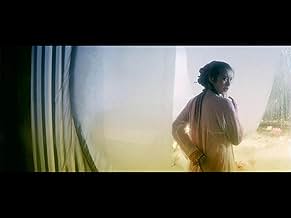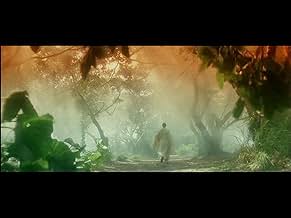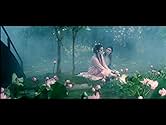AVALIAÇÃO DA IMDb
7,2/10
4 mil
SUA AVALIAÇÃO
Adicionar um enredo no seu idiomaTwo snake spirits become human and learn about love and suffering. A monk discovers his own weaknesses and finds that morality is not as simple as he had thought.Two snake spirits become human and learn about love and suffering. A monk discovers his own weaknesses and finds that morality is not as simple as he had thought.Two snake spirits become human and learn about love and suffering. A monk discovers his own weaknesses and finds that morality is not as simple as he had thought.
- Prêmios
- 3 indicações no total
Avaliações em destaque
10NateManD
Director Tsui Hark is most well known for "Black Mask", "Zu Warriors" and "Once upon a time in China", but not too many have seen "Green Snake". "Green Snake" is one of the most breathtaking Hong Kong films next to "Hero". It has many similar elements to Zu Warriors, since so many of the characters can fly. The story is based on an ancient Chinese folk tale. Two sisters are snakes, but they disguise themselves as humans, since snakes are looked down upon. A master monk is out to destroy the sisters fearing that they're a threat. White snake wants to be normal, she marries a clumsy monk who has no idea she's a snake. Green Snake is the wild sister, who enjoys morphing from snake to human form. Although the film's giant snake looks kind of fake, the film makes up for it with creativity. Bright colors, surreal dreamlike landscapes and martial arts magic are all part of "Tsui Hark's "Green Snake". It's also very trippy, like "Fellini Satyricon". "Green Snake" is an amazing film that needs to be seen!
It is a really good movie. Both teal snake and white snake are charming and deadly attractive. Xu Xian is a everyday Joe male character. No man won't envy his good luck with beautiful women! ;) The monk--Fa Hai--is stubborn and prejudiced in his attitude towards human and non-humans. In the end, he seems to regret what he has done to the snake sisters. The story stresses the sexual desire of human beings. ;) Even the monk, who has reached the prestige of human-buddie, cannot deprive himself of sexual imagination and impulse.
The pace of the story telling is fast; the structure of the story plots is compact; the special visual effect of magic casting and fighting is eye catching; and the music and singing is touching and resonant with the progress of the story.
The pace of the story telling is fast; the structure of the story plots is compact; the special visual effect of magic casting and fighting is eye catching; and the music and singing is touching and resonant with the progress of the story.
Tsui Hark's magical fantasy Green Snake is such a tour de force of stunning visuals and expertly crafted moments of cinema magic that one can easily forgive the occasional dodgy special effect or lapse in narrative cohesion.
Maggie Cheung plays the beautiful titular character, one of a pair of benign female snake demons who have mastered the ability to transform themselves into humans. Her companion, White Snake (Joey Wang), is far more experienced than Green at altering her appearance, and has also managed to acquire human emotions, falling in love with a young scholar Hsui Xien (who is quite unaware that his girl is actually a scaly serpent in disguise).
Desperate to experience the same feelings as White, but unable to control her desires, Green also attempts to seduce Hsui Xien (the lucky old so-and-so), and even tries to seduce a powerful monk, Faat Hoi, whose mission it is to trap demons; this naturally causes all kinds of problems which eventually result in Hsui Xien discovering White's secret.
For the majority of its running time, the lyrical beauty of Hark's tale is more than enough to retain one's attention; even when there isn't much happening story-wise, the film is shot with such style that it is totally captivating. For example, the scene in which Green gatecrashes a Bollywood dance routine while a rain-drenched White slithers off to spy on the scholar might not add much to the plot, but with its lush colours, amazing soundtrack, and Cheung's impossibly sexy performance, it's one of the most memorable cinematic sequences that I've seen.
Towards the end of the film, events do start to become slightly wearisome, and perhaps the film is a little too long for its own good; some viewers may find Hark's leisurely pace a little too slow, whilst others might laugh at the sometimes less-than-effective special effects (the CGI magic crane is certainly very weak). However, the film's positives far outweigh its negatives, and fans of Asian fantasy should definitely seek it out.
Maggie Cheung plays the beautiful titular character, one of a pair of benign female snake demons who have mastered the ability to transform themselves into humans. Her companion, White Snake (Joey Wang), is far more experienced than Green at altering her appearance, and has also managed to acquire human emotions, falling in love with a young scholar Hsui Xien (who is quite unaware that his girl is actually a scaly serpent in disguise).
Desperate to experience the same feelings as White, but unable to control her desires, Green also attempts to seduce Hsui Xien (the lucky old so-and-so), and even tries to seduce a powerful monk, Faat Hoi, whose mission it is to trap demons; this naturally causes all kinds of problems which eventually result in Hsui Xien discovering White's secret.
For the majority of its running time, the lyrical beauty of Hark's tale is more than enough to retain one's attention; even when there isn't much happening story-wise, the film is shot with such style that it is totally captivating. For example, the scene in which Green gatecrashes a Bollywood dance routine while a rain-drenched White slithers off to spy on the scholar might not add much to the plot, but with its lush colours, amazing soundtrack, and Cheung's impossibly sexy performance, it's one of the most memorable cinematic sequences that I've seen.
Towards the end of the film, events do start to become slightly wearisome, and perhaps the film is a little too long for its own good; some viewers may find Hark's leisurely pace a little too slow, whilst others might laugh at the sometimes less-than-effective special effects (the CGI magic crane is certainly very weak). However, the film's positives far outweigh its negatives, and fans of Asian fantasy should definitely seek it out.
From time to time I like to dabble in a pool of older genre films. I don't find many masterpieces there, but some films are pretty entertaining. And once in a while, something really neat pops up. Green Snake is one of those films, ranking among the top films the early 90s Hong Kong period has to offer.
Green Snake is a strange blend of genres, but not at all uncommon for those type of films. If you want to compare it to anything (that is remotely known) I guess A Chinese Ghost Story comes closest.
The film's main focus are two demon snakes that have traveled to the human world to live a better life. They act as dames and try to find a husband, as they can secure their lives in the human world by getting a human child. This might sound a bit silly, but in essence it differs little from many Roman or Greek legends we know (and accept them for what they are).
Of course, no HK film from that period is complete with at least some flashes of martial arts thrown in. So a traveling monk and Buddha priest are added to make the lives of our snakes a bit harder. Both are trained in the more magical areas of the martial arts field, resulting in many magical spells and little hand to hand combat.
What sets this film apart from his peers is the visual brilliance. It won't be to everyone's liking, but the abundant use of color is simply superb. Every shot in the film looks lush, be it through it's impressive, colorful set design or through the many filters that are used. The editing gives you little time to absorb all this beauty, but every new shot is impressive enough not to care.
Also typical for these type of films is the type of editing used. Because the means and budgets were not high enough to create the effects required in a believable way, many magical scenes are often shot up close and edited in such a way that the viewer will fill in the blanks. It can become a bit confusing this way, but all in all it's a splendid solution. Some scenes still look pretty cheap, but overall the effects never take away from the film.
Another thing worth mentioning is the music. Although probably hit and miss for many, I liked the music Hark has chosen for this film. Especially the song with the Indian (?) dancers stayed long after the movie had finished. Pretty strange, not everyone will far for it but I think it worked wonders here.
Of course, there's also the quirky acting and silly humor that are ever present in these HK films. It comes with the territory and I don't mind one single bit, but it's another factor that will turn off some people from films like Green Snake. Their loss I guess.
It's pretty easy to love or hate these kind of films. But if you're a fan of this kind of cinema, Green Snake is one of the best films to pick. It's Tsui Hark at his best, the film is lush in its visuals and score, is entertaining to the core and wastes no time on unnecessary things. Very likable and extremely well-made. 4.0*/5.0*
Green Snake is a strange blend of genres, but not at all uncommon for those type of films. If you want to compare it to anything (that is remotely known) I guess A Chinese Ghost Story comes closest.
The film's main focus are two demon snakes that have traveled to the human world to live a better life. They act as dames and try to find a husband, as they can secure their lives in the human world by getting a human child. This might sound a bit silly, but in essence it differs little from many Roman or Greek legends we know (and accept them for what they are).
Of course, no HK film from that period is complete with at least some flashes of martial arts thrown in. So a traveling monk and Buddha priest are added to make the lives of our snakes a bit harder. Both are trained in the more magical areas of the martial arts field, resulting in many magical spells and little hand to hand combat.
What sets this film apart from his peers is the visual brilliance. It won't be to everyone's liking, but the abundant use of color is simply superb. Every shot in the film looks lush, be it through it's impressive, colorful set design or through the many filters that are used. The editing gives you little time to absorb all this beauty, but every new shot is impressive enough not to care.
Also typical for these type of films is the type of editing used. Because the means and budgets were not high enough to create the effects required in a believable way, many magical scenes are often shot up close and edited in such a way that the viewer will fill in the blanks. It can become a bit confusing this way, but all in all it's a splendid solution. Some scenes still look pretty cheap, but overall the effects never take away from the film.
Another thing worth mentioning is the music. Although probably hit and miss for many, I liked the music Hark has chosen for this film. Especially the song with the Indian (?) dancers stayed long after the movie had finished. Pretty strange, not everyone will far for it but I think it worked wonders here.
Of course, there's also the quirky acting and silly humor that are ever present in these HK films. It comes with the territory and I don't mind one single bit, but it's another factor that will turn off some people from films like Green Snake. Their loss I guess.
It's pretty easy to love or hate these kind of films. But if you're a fan of this kind of cinema, Green Snake is one of the best films to pick. It's Tsui Hark at his best, the film is lush in its visuals and score, is entertaining to the core and wastes no time on unnecessary things. Very likable and extremely well-made. 4.0*/5.0*
10vid-10
Two snakes that evolved into women, a tibetan priest, a teacher of poetry and a wonderful frame made up of peach blossom petals, lotus flowers and lanterns lit at night on the river are the ingredients that make "Green Snake" a dream-like movie. The story, slow compared to Tsui Hark standards, flows through two paths: on the first one (lighthearted, playful and with a touch of irony which is never unwelcome) we get to enjoy the life of two snake-girls (White Snake, played by Joey Wang, and Green Snake, played by Maggie cheung) who, by stumbling into a village and alluring every one, cause a lot of turmoil among the people's hearts. White Snake, having trained much more than Green Snake and thus having acquired human feelings, actually succeeds in winning the love of the poetry teacher. On another scenario, the tibetan priest lives in a nearby temple, meditating, trying to gain spiritual ascension, helping people whenever they are in trouble and in general doing his best to preserve the natural balance of the world. However, not everything is like it seems at first glance: while the two snake-girls actually show some positive will and determination as they tend sick people, the priest, although he stops tidal waves from flooding the village, never goes down to experiencing the condition of people... and, by acting as judge, risks of falling into the trap of self-esteem and prejudice. Apart from the thoughtfulness it inspires, the movie is unique in fantasy and never ceases to wonder, regardless if it's autumn, winter or spring! 10/10
Você sabia?
- ConexõesFeatured in Um Toque de Pecado (2013)
Principais escolhas
Faça login para avaliar e ver a lista de recomendações personalizadas
- How long is Green Snake?Fornecido pela Alexa
Detalhes
- Tempo de duração1 hora 39 minutos
- Mixagem de som
- Proporção
- 2.35 : 1
Contribua para esta página
Sugerir uma alteração ou adicionar conteúdo ausente


